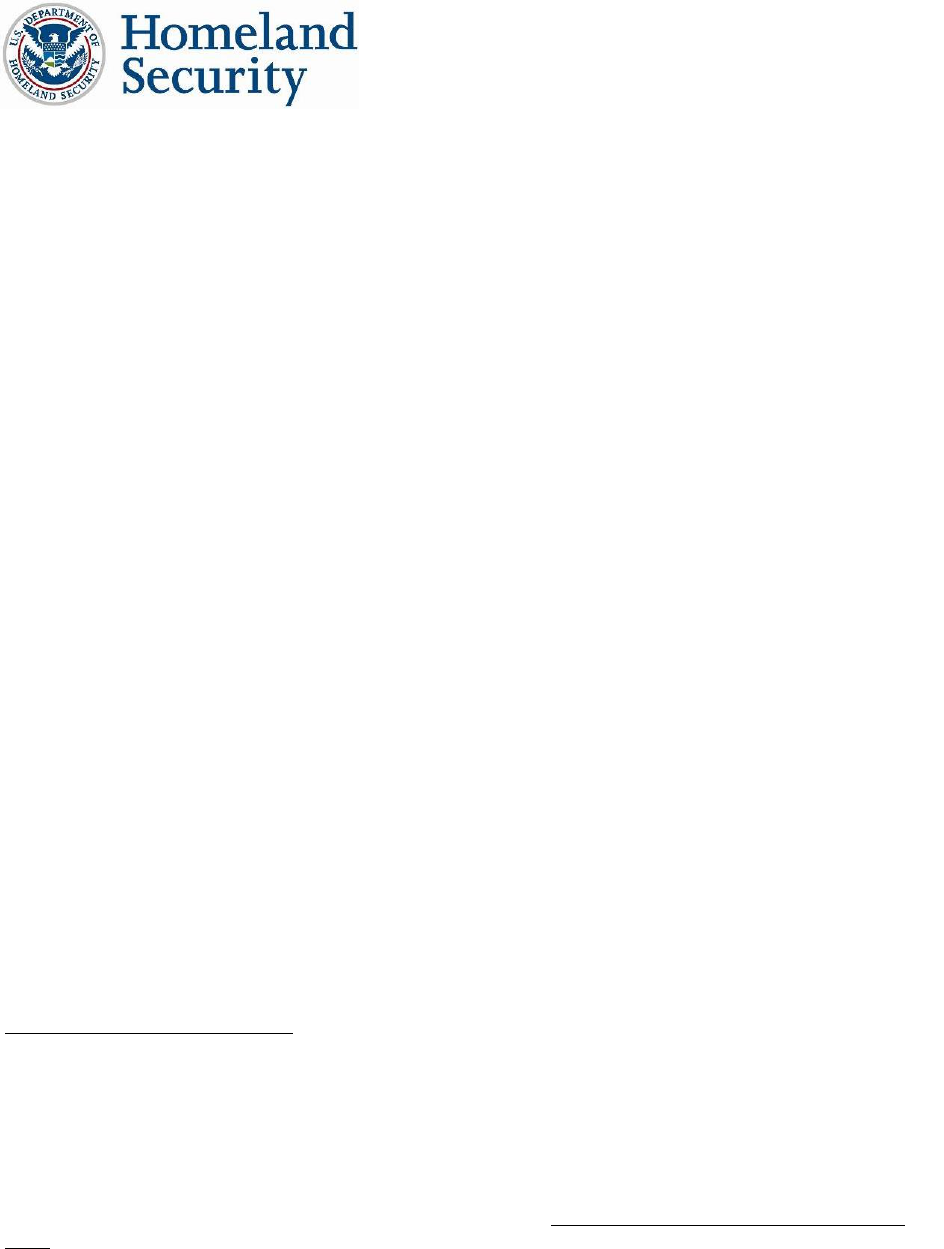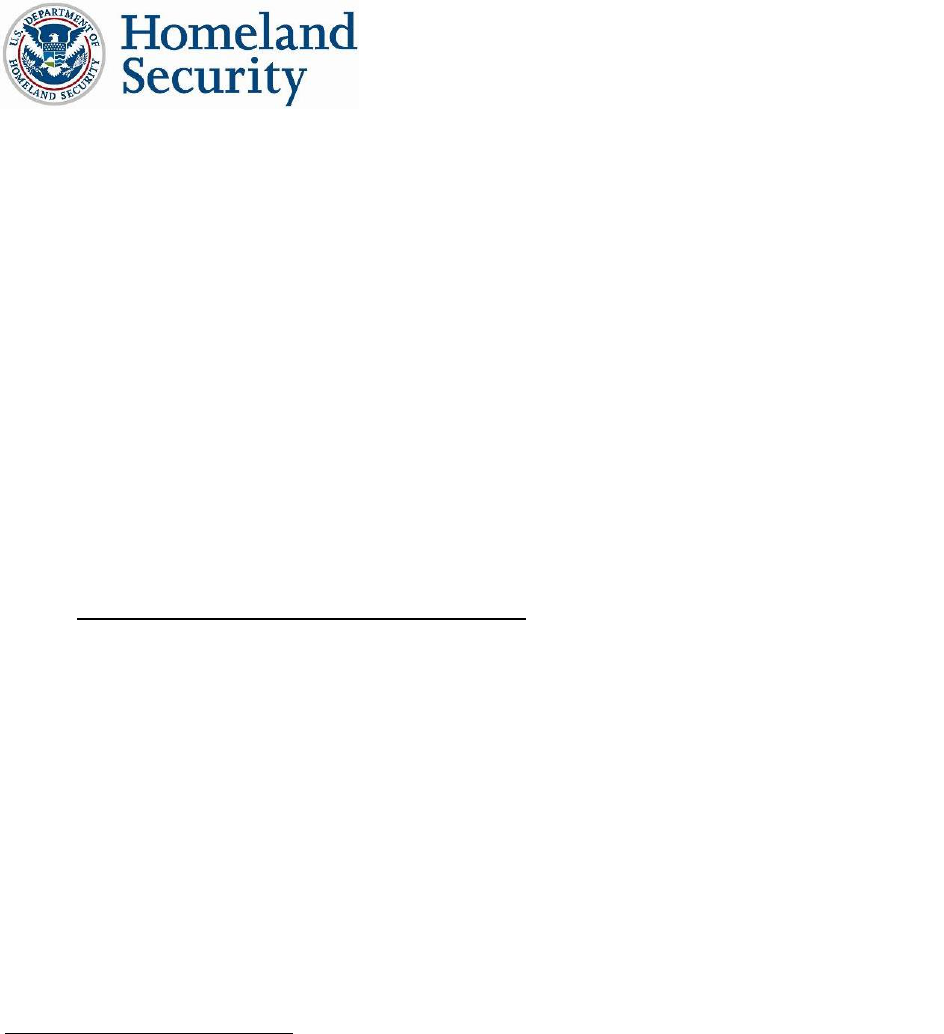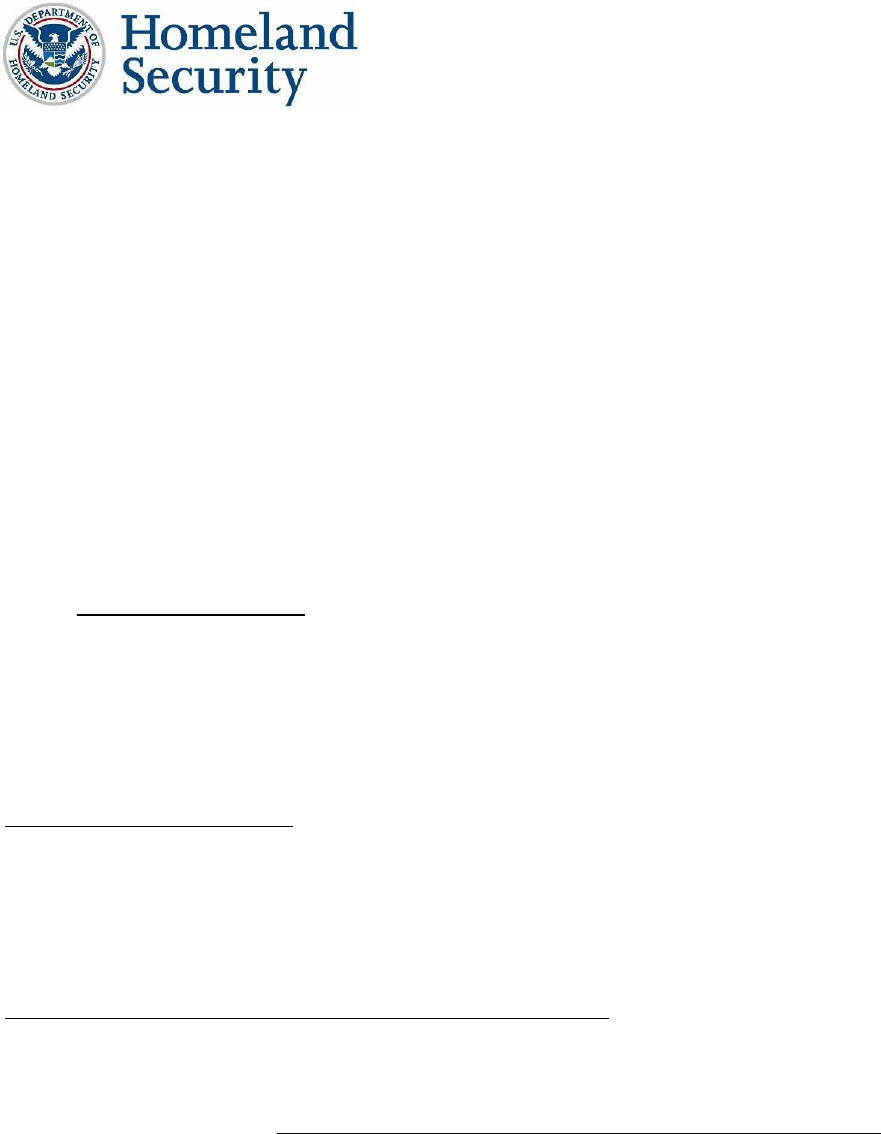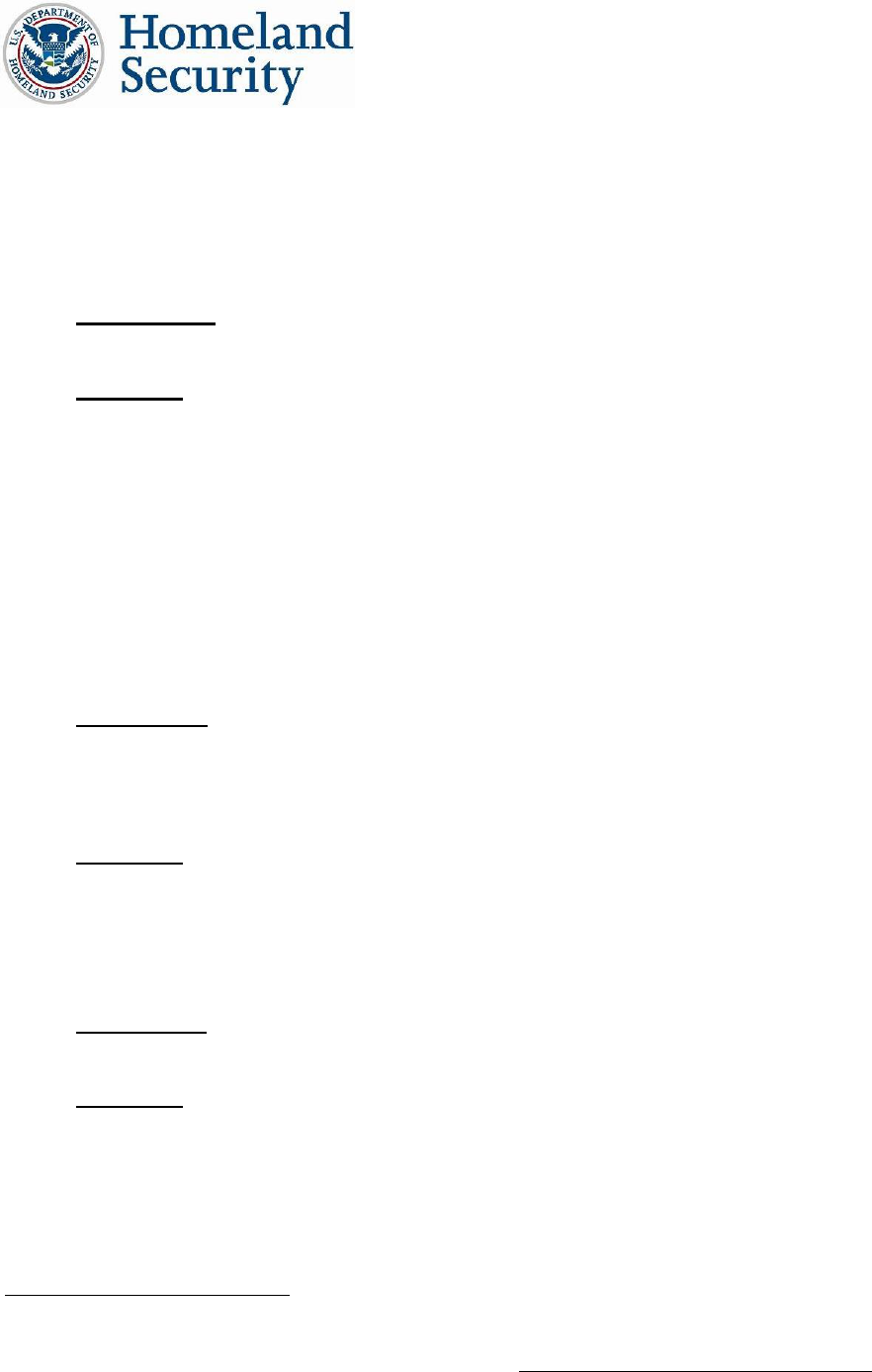
Privacy Impact Assessment
for the
Guam-Commonwealth of the Northern Mariana Islands Visa
Waiver Program
DHS Reference No. DHS/CBP/PIA-079
January 18, 2024

Privacy Impact Assessment
DHS/CBP/PIA-079 G-CNMI Visa Waiver Program
Page 1
Abstract
In general, nonimmigrant visitors to the U.S. territories of Guam and the Commonwealth
of the Northern Mariana Islands (CNMI) are required to obtain a visa from the U.S. Department
of State before being admitted. CBP created the Guam-Commonwealth of the Northern Mariana
Islands (G-CNMI) Visa Waiver Program (VWP) which allows certain nonimmigrant visitors to
seek admission to Guam and/or the CNMI without a visa for a period of authorized stay not to
exceed 45 days. Nonimmigrants use the Form I-736, Guam-CNMI Visa Waiver Information, to
determine eligibility to travel under the G-CNMI Visa Waiver Program. The U.S. Department of
Homeland Security (DHS) U.S. Customs and Border Protection (CBP) is publishing this Privacy
Impact Assessment (PIA) to provide notice and assess the privacy risks associated with the G-
CNMI Visa Waiver Program, including the newly created restricted sub-program CNMI Economic
Vitality & Security Travel Authorization Program (EVS-TAP), and the newly established
electronic Form I-736, which is used to grant travel authorization to nonimmigrants prior to their
embarkation to Guam or the CNMI.
Overview
In 2009, DHS/CBP issued an interim final rule (IFR)
1
in the Federal Register replacing the
then-existing Guam Visa Waiver Program with the G-CNMI Visa Waiver Program. Under the
previous Guam Visa Waiver Program, citizens of eligible countries or geographic areas were
permitted to apply for admission to Guam at a Guam Port of Entry (POE) as nonimmigrant visitors
for a period of 15 days or less, for business or pleasure, without first obtaining a nonimmigrant
visa, provided that they are otherwise eligible for admission under applicable statutory and
regulatory requirements.
2
The 2009 Interim Final Rule also set forth the requirements for
nonimmigrant visitors seeking admission into the U.S. territories, Guam, and the CNMI.
3
Public
Law 110-229 permits the Secretary of Homeland Security to create a visa waiver program for
1
See 74 FR 2824 (January 16, 2009).
2
Under the existing program, eligible participants must be a citizen of a country that: (i) has a visa refusal rate of
16.9% or less, or a country whose visa refusal rate exceeds 16.9% and has an established pre-inspection or
preclearance program, pursuant to a bilateral agreement with the United States; (ii) is within geographical proximity
to Guam unless the country has a substantial volume of nonimmigrant admissions to Guam as determined by the
Commissioner of CBP and extends reciprocal privileges to citizens of the United States; (iii) is not designated by the
Department of State as being of special humanitarian concern; and (iv) poses no threat to the welfare, safety, or
security of the United States, its territories, or commonwealths (See https://www.ecfr.gov/current/title-8/section-
212.1). The existing regulations also provide that any potential threats to the welfare, safety, or security of the
United States, its territories, or commonwealths be dealt with on a country-by-country basis. A determination by the
Secretary of Homeland Security that a threat existed will result in the immediate deletion of the country from the
listing of eligible countries.
3
Guam and the CNMI are considered U.S. territories. While U.S. territories fall under the jurisdiction of the U.S.
federal government, they are not considered states and do not hold the same status as one (e.g., U.S. territories are
not represented as part of the United States Congress).

Privacy Impact Assessment
DHS/CBP/PIA-079 G-CNMI Visa Waiver Program
Page 2
Guam and CNMI that permits nonimmigrants from certain countries
4
to be exempt from the visa
requirement when seeking entry into the United States as a visitor for a maximum stay of 45 days,
provided that no potential threat exists to the welfare, safety, or security of the United States or its
territories, and other criteria are met. The G-CNMI Visa Waiver Program is similar but distinctly
different from the Electronic System for Travel Authorization (ESTA),
5
an application and
screening system used to determine whether citizens and nationals from countries participating in
the Visa Waiver Program
6
are eligible to travel to the contiguous United States.
To be eligible to travel under the G-CNMI Visa Waiver Program, prior to embarking on a
carrier for travel to Guam or the CNMI, each nonimmigrant must:
• Be a national of a country or geographic area listed in 8 C.F.R. § 212.1;
• Be classifiable as a visitor for business or pleasure;
• Be solely entering and staying on Guam or the CNMI for a period not to exceed 45
days;
• Be in possession of a round trip ticket
7
that is nonrefundable and nontransferable and
bears a confirmed departure date not exceeding 45 days from the date of admission to
Guam or the CNMI;
• Be in possession of a completed and signed CBP Form I-736, Guam-CNMI Visa
Waiver Information;
• Be in possession of a completed I-94, Arrival/Departure Record;
• Be in possession of a valid unexpired International Civil Aviation Organization (ICAO)
compliant, machine-readable passport issued by a country eligible to travel to Guam or
CNMI under the G-CNMI Visa Waiver Program;
4
Travelers from the following countries may participate in the G-CNMI Visa Waiver Program: Australia, Brunei,
Hong Kong, Japan, Malaysia, Nauru, New Zealand, Papua New Guinea, South Korea, Singapore, Taiwan, and the
United Kingdom.
5
See U.S. DEPARTMENT OF HOMELAND SECURITY, U.S. CUSTOMS AND BORDER PROTECTION,
PRIVACY IMPACT ASSESSMENT FOR THE ELECTRONIC SYSTEM FOR TRAVEL AUTHORIZATION,
DHS/CBP/PIA-007 (2008 and subsequent updates), available at https://www.dhs.gov/privacy-documents-us-
customs-and-border-protection.
6
Public Law 106-396 established the Visa Waiver Program, which permits citizens of designated participating
countries to travel to the United States for business or tourism for stays of up to 90 days without a visa. In return,
those designated participating countries must permit U.S. citizens and nationals to travel to their countries for a
similar length of time without a visa for business or tourism purposes.
7
“Round trip ticket” includes any return trip transportation ticket issued by a participating carrier, electronic ticket
record, airline employee passes indicating return passage, individual vouchers for return passage, group vouchers for
return passage for charter flights, or military travel orders which include military dependents for return to duty stations
outside the United States on U.S. military flights.

Privacy Impact Assessment
DHS/CBP/PIA-079 G-CNMI Visa Waiver Program
Page 3
• Have not previously violated the terms of any prior admissions;
8
• Acknowledge and waive any right to review or appeal an immigration officer’s
determination of admissibility at the port of entry into Guam or the CNMI;
• Acknowledge and waive any right to contest any action for deportation or removal,
other than on the basis of an application for withholding of removal under section
241(b)(3) of the Immigration and Nationality Act (INA); withholding or deferral of
removal under the regulations implementing Article 3 of the United Nations
Convention Against Torture and Other Cruel, Inhuman or Degrading Treatment or
Punishment; or, an application for asylum if permitted under section 208 of the Act;
and
• If a resident of Taiwan, possess a Taiwan National Identity Card and a valid Taiwan
passport with a valid re-entry permit.
Historical Paper Process for the Form I-736
Since the inception of the G-CNMI Visa Waiver Program, CBP has required
nonimmigrants to complete a paper Form I-736, Guam-CNMI Visa Waiver Information, in lieu of
the visa requirement.
9
Nonimmigrants completed, printed, and signed the paper Form I-736 prior
to their embarkation to Guam or the CNMI.
10
The paper Form I-736 requested biographic
information and responses to eligibility questions that were necessary to determine the eligibility
of the nonimmigrant to travel to under the G-CNMI Visa Waiver Program. The paper Form I-736
also had a set of eligibility questions that were used to determine the eligibility of the individual
to travel to Guam or the CNMI and whether such travel posed a law enforcement or security risk.
Upon arrival at their embarkation location, nonimmigrants were required to present the form to the
carrier personnel prior to departure.
11
8
Prior admissions include those under the G-CNMI Visa Waiver Program, the prior Guam Visa Waiver Program,
the Visa Waiver Program as described in section 217(a) of the INA, and admissions pursuant to any immigrant or
nonimmigrant visa.
9
For any of the following conditions, an I-736 is not required: (1) the traveler holds a valid visa for travel to the United
States; (2) the traveler is a citizen of Australia, Brunei, Japan, New Zealand, South Korea, Singapore, Taiwan, or the
United Kingdom and has a current Electronic System for Travel Authorization enrollment; or (3) a traveler from the
People’s Republic of China holds a valid visa for travel to the United States and has a valid Electronic Visa Update
System (EVUS) enrollment.
10
Nonimmigrants could obtain the Form I-736 through CBP’s website, and then complete the form electronically,
print it, and provide it to the CBP officer. Nonimmigrants also had the option to print and complete the form by
hand. Additionally, nonimmigrants could receive a paper version of Form I-736 from the carrier upon their
disembarkation to Guam or the CNMI.
11
While there has historically been a requirement to present a completed and signed I-736, no penalties or fines
have been issued to carriers who did not require nonimmigrants to present the signed form prior to or at the time of
boarding.

Privacy Impact Assessment
DHS/CBP/PIA-079 G-CNMI Visa Waiver Program
Page 4
Upon arrival at either the Federal Inspection Station (FIS) at a Guam or CNMI port of
entry, nonimmigrants provided CBP officers with the completed paper Form I-736. The CBP
officer reviewed the completed Form I-736 as part of the standard inspection process and entered
information from the form into the G-CNMI database, a subsystem under the TECS security
boundary.
12
The CBP officer used the information from the paper I-736 along with the information
gained through the inspection to determine the nonimmigrants admissibility to Guam or the CNMI.
Once the traveler was processed, the port of entry collected the paper forms and shipped them to
a central storage location.
The reliance on a paper-based form and the absence of pre-arrival vetting due to the lack
of automation and submission of a paper Form I-736 limited CBP’s ability to implement an
essential part of its national security strategy to pre-vet individuals arriving in Guam and the
CNMI. Pre-vetting allows the CBP officer to have all the information from systems checks readily
available as part of the officer’s comprehensive admissibility determination.
As part of this strategy, CBP has implemented several advance information collections
through which the agency obtains information in advance of arrival either directly from the traveler
(e.g., Electronic System for Travel Authorization,
13
Trusted Traveler Programs,
14
Electronic Visa
12
See U.S. DEPARTMENT OF HOMELAND SECURITY, U.S. CUSTOMS AND BORDER PROTECTION,
PRIVACY IMPACT ASSESSMENT FOR THE TECS SYSTEM: CBP PRIMARY AND SECONDARY
PROCESSING, DHS/CBP/PIA-009 (2010 and subsequent updates) and TECS SYSTEM PLATFORM,
DHS/CBP/PIA-021 (2016), available at https://www.dhs.gov/privacy-documents-us-customs-and-border-protection.
13
The Visa Waiver Program permits eligible travelers from certain participating countries to travel to the United
States without first obtaining a visa. Participation in the Visa Waiver Program requires enrollment in CBP’s
Electronic System for Travel Authorization program. See U.S. DEPARTMENT OF HOMELAND SECURITY,
U.S. CUSTOMS AND BORDER PROTECTION, PRIVACY IMPACT ASSESSMENT FOR THE ELECTRONIC
SYSTEM FOR TRAVEL AUTHORIZATION, DHS/CBP/PIA-007 (2008 and subsequent updates), available at
https://www.dhs.gov/privacy-documents-us-customs-and-border-protection.
14
Trusted Traveler Programs are risk-based programs that facilitate expedited processing of pre-approved low-risk
travelers. CBP offers several types of Trusted Traveler Programs for arrival at air, sea, and land ports of entry.
Eligible travelers who apply for a particular program are vetted against various law enforcement databases, and
those who are conditionally approved are interviewed. During the interview, CBP collects biometric information.
Trusted Traveler Program members are subject to recurrent vetting to ensure that these travelers do not pose threats
to law enforcement or national security and to determine their continued eligibility to receive expedited processing
at ports of entry. Trusted Traveler Programs are generally limited to U.S. citizens, with certain exceptions. See U.S.
DEPARTMENT OF HOMELAND SECURITY, U.S. CUSTOMS AND BORDER PROTECTION, PRIVACY
IMPACT ASSESSMENT FOR THE GLOBAL ENROLLMENT SYSTEM (GES), DHS/CBP/PIA-002 (2006 and
subsequent updates), available at https://www.dhs.gov/privacy-documents-us-customs-and-border-protection.

Privacy Impact Assessment
DHS/CBP/PIA-079 G-CNMI Visa Waiver Program
Page 5
Update System (EVUS)
15
) or from carriers and operators (e.g., Advance Passenger Information
16
and Passenger Name Record
17
). As described above, the G-CNMI Visa Waiver Program is most
like the Electronic System for Travel Authorization program, which collects information in
advance to determine whether certain nonimmigrants are eligible to travel to the United States
under the Visa Waiver Program. Nonimmigrants electronically submit Electronic System for
Travel Authorization applications to CBP in advance for CBP to determine whether the
nonimmigrant is authorized to travel to the United States. On January 18, 2024, CBP issued the
Guam-Commonwealth of the Northern Mariana Islands (CNMI) Visa Waiver Program
Automation and Electronic Travel Authorization; Creation of CNMI Economic Vitality & Security
Travel Authorization Program (EVS-TAP) Interim Final Rule. Under this Interim Final Rule, CBP
announced the automation of the Form I-736, which now requires nonimmigrants to obtain travel
authorization prior to traveling to Guam or the CNMI. This interim final rule is effective September
30, 2024.
Electronic Form I-736
Like the Electronic System for Travel Authorization program, CBP is automating the
submission of the Form I-736 which is available on the CBP website. Each nonimmigrant visitor
wishing to travel to Guam or the CNMI under the G-CNMI Visa Waiver Program, or a
representative on their behalf, must submit an electronic Form I-736 and obtain travel
authorization prior to embarking on a carrier.
18
CBP recommends that G-CNMI Visa Waiver
15
CBP’s Electronic Visa Update System is a web-based enrollment system used to collect information from
nonimmigrant noncitizens who 1) hold a passport that was issued by an identified country approved for inclusion in
the Electronic Visa Update System program and 2) have been issued a U.S. nonimmigrant visa of a designated
category. The Electronic Visa Update System, like the Electronic System for Travel Authorization program, collects
updated information in advance of an individual’s travel to the United States. See U.S. DEPARTMENT OF
HOMELAND SECURITY, U.S. CUSTOMS AND BORDER PROTECTION, PRIVACY IMPACT
ASSESSMENT FOR THE ELECTRONIC VISA UPDATE SYSTEM, DHS/CBP/PIA-033 (2016), available at
https://www.dhs.gov/privacy-documents-us-customs-and-border-protection.
16
In accordance with 19 C.F.R. §§ 122.49a, 122.49b, air carriers are required to send passenger and crew manifests
to CBP before an air carrier departs from the foreign port or place for the United States. See U.S. DEPARTMENT
OF HOMELAND SECURITY, U.S. CUSTOMS AND BORDER PROTECTION, PRIVACY IMPACT
ASSESSMENT FOR THE ADVANCE PASSENGER INFORMATION SYSTEM, DHS/CBP/PIA-001 (2005 and
subsequent updates), available at https://www.dhs.gov/privacy-documents-us-customs-and-border-protection.
17
49 U.S.C. § 44909(c)(3) and its implementing regulation at 19 C.F.R. § 122.49d require air carriers operating
flights to or from the United States to provide CBP with certain passenger reservation information, called Passenger
Name Record data, to the extent it is collected and contained in the air carrier’s reservation and/or departure control
systems.
18
To accommodate people who may not have familiarity with or access to computers or the internet, DHS designed
the Form I-736 website to allow a third party, such as a relative, friend, or travel agent, to submit an application on
behalf of the nonimmigrant. In all cases, the nonimmigrant is responsible for the answers submitted on their behalf
by a third party and the third party must check the box on the I-736 application indicating that the third party
completed the application on the nonimmigrant’s behalf. The email address provided should be the traveler’s email
address. If the nonimmigrant does not have an email address, an alternative third-party email address belonging to a
point of contact (e.g., a family member, friend, or business associate) must be provided.

Privacy Impact Assessment
DHS/CBP/PIA-079 G-CNMI Visa Waiver Program
Page 6
Program travelers obtain travel authorizations at the time of the travel reservation or purchase of
the travel ticket, or at least five (5) days before departure to Guam or the CNMI to facilitate timely
departures. This timeline allows for CBP to complete the necessary pre-vetting prior to an
individual embarking on their travels.
As CBP transitions to an electronic Form I-736, CBP has incorporated 60day transition
period into the Interim Final Rule to allow nonimmigrants to adjust to a new collection method.
During this transition period, nonimmigrants and their representatives can choose to either submit
the Form I-736 in advance electronically and receive electronic travel authorization prior to
embarking on a carrier or submit the paper Form I-736 upon arrival. At the end of the transition
period, the paper Form I-736 will become obsolete, and nonimmigrants must input and submit in
advance their personal information and respond to the eligibility questions using the new electronic
format.
The website offers relevant information, including who is required to submit the Form I-
736, what information is needed to apply for the I-736, a link to begin the I-736 application, and
how to check the status of the application. To begin the application, the nonimmigrant or
representative selects the “Create New Application” option. Once selected, Security
Notification,
19
Disclaimer,
20
and Privacy Act Statement pop-ups are presented to the
nonimmigrant and/or representative and must be acknowledged prior to beginning the I-736.
Once all pop-us are acknowledged, the Form I-736 website prompts the individual to
manually enter several pieces of information from their passport and other biographic information
including:
• Full name;
• Alias;
• Date of Birth;
• City of Birth;
• Country of Birth;
• Gender;
• E-mail address;
19
The Security Notification notifies the user that they are about to access a DHS system.
20
The Disclaimer describes the purpose for the collection and indicates that the information provided by the
individual, or on the individual’s behalf by a designated third party, must be true and correct. The Disclaimer
notifies the user that the information provided in the submission is used to perform checks against law enforcement
databases. The Disclaimer also provides notice of administrative or criminal penalties if the individual knowingly
and willfully makes a materially false, fictitious, or fraudulent statement or representation in an advance travel
authorization submission.

Privacy Impact Assessment
DHS/CBP/PIA-079 G-CNMI Visa Waiver Program
Page 7
• Phone Number, including country code;
• Home address, to include city, state/province/region, country;
• Social Media handle(s) and platform(s) used (optional);
• Destination address;
• Destination Phone number;
• Citizenship and nationality information (e.g., other country of
citizenships/nationalities, how the traveler acquired citizenship/nationality,
national identification number);
• Passport information (e.g., number, issuing country, issuance/expiration date);
• U.S. immigrant and nonimmigrant visa history information (e.g., place and date of
application, type of visa requested, whether visa was
issued/denied/withdrawn/cancelled);
• CBP Global Entry Program membership number/PASSID, if applicable;
• Parent names, if under the age of 14;
• Emergency contact information (name, email address, phone number, country);
• Responses to the following questions, such as:
o Do you have a physical or mental disorder; or are you a drug abuser or
addict; or do you currently have any of the following diseases?
21
o Have you ever been arrested or convicted for a crime that resulted in serious
damage to property, or serious harm to another person or government
authority?
o Have you ever violated any law related to possessing, using, or distributing
illegal drugs?
o Do you seek to engage in or have you ever engaged in terrorist activities,
espionage, sabotage, or genocide?
o Have you ever committed fraud or misrepresented yourself or others to
obtain, or assist others to obtain, a visa or entry into the United States?
21
Communicable diseases are specified pursuant to section 361(b) of the Public Health Service Act: Cholera,
Diphtheria, Tuberculosis infectious, Plague, Smallpox, Yellow Fever, Viral Hemorrhagic Fevers, including Ebola,
Lassa, Marburg, Crimean-Congo, severe acute respiratory illnesses capable of transmission to other persons and
likely to cause mortality.

Privacy Impact Assessment
DHS/CBP/PIA-079 G-CNMI Visa Waiver Program
Page 8
o Have you ever stayed in the United States longer than the admission period
granted to you by the U.S. government?
o Are you currently seeking employment in Guam or CNMI?
o Were you previously employed in the United States without prior
permission from the U.S. government?
o Have you traveled to, or been present in Iraq, Syria, Iran, Sudan, Libya,
Somalia, Yemen, or Cuba on or after March 1, 2011?
Once submitted, the nonimmigrant or their representative reviews the application and makes any
necessary edits or corrections. CBP then uses the biographic information, including the optional
social media identifiers, to conduct pre-vetting of G-CNMI bound nonimmigrants. A decision to
forgo responding to the optional/voluntary social media question will not result in a denial of the
travel authorization by CBP. CBP conducts vetting against selected security and law enforcement
databases at DHS, including TECS
22
and the Automated Targeting System (ATS),
23
as well as
publicly available sources (e.g., social media websites, even if the applicant chooses not to provide
social media information). If an initial screening by CBP indicates possible information of concern,
CBP may use tools and search techniques to locate and positively identify social media accounts
and profiles belonging to the nonimmigrant applicant. Under no circumstance will CBP violate
any social media privacy settings in the processing of the I-736 and will adhere to all Department
policy regarding the use of social media information.
24
Additionally, CBP will never ask an
applicant to supply their social media platform password.
Soon after the traveler inputs their information into the electronic version of Form I-736,
the traveler, in most cases, will receive a positive determination of travel eligibility. The I-736
website displays the following status messages:
o Authorization Approved – The travel authorization has been approved and the
applicant is authorized to travel to Guam and/or the CNMI under the G-CNMI Visa
Waiver Program. A travel authorization does not guarantee admission into the
United States as a CBP officer at a port of entry will make the final determination
regarding admissibility.
22
See U.S. DEPARTMENT OF HOMELAND SECURITY, U.S. CUSTOMS AND BORDER PROTECTION,
PRIVACY IMPACT ASSESSMENT FOR THE TECS SYSTEM: CBP PRIMARY AND SECONDARY
PROCESSING, DHS/CBP/PIA-009 (2010 and subsequent updates) and TECS SYSTEM PLATFORM,
DHS/CBP/PIA-021 (2016), available at https://www.dhs.gov/privacy-documents-us-customs-and-border-protection.
23
See U.S. DEPARTMENT OF HOMELAND SECURITY, U.S. CUSTOMS AND BORDER PROTECTION,
PRIVACY IMPACT ASSESSMENT FOR THE AUTOMATED TARGETING SYSTEM, DHS/CBP/PIA-006(e)
(2017), available at https://www.dhs.gov/privacy-documents-us-customs-and-border-protection.
24
See Privacy Policy for Operational Use of Social Media Instruction 110-01-001 (2012), available at
https://www.dhs.gov/publication/privacy-policy-operational-use-social-media-instruction-110-01-001.

Privacy Impact Assessment
DHS/CBP/PIA-079 G-CNMI Visa Waiver Program
Page 9
o Travel Not Authorized – The applicant is not authorized to travel to Guam and/or
the CNMI under the G-CNMI Visa Waiver Program. The applicant may be able to
obtain a visa from the Department of State for travel. Please visit the Department
of State website at http://www.travel.state.gov for additional information about
applying for a visa. This response does not deny entry into Guam and/or the CNMI.
This response only prohibits the applicant from traveling to Guam and/or the CNMI
under the G-CNMI Visa Waiver Program.
o Authorization Pending – The applicant’s travel authorization is under review
because an immediate determination could not be made on the application. This
response does not indicate negative findings.
If travel is not authorized, the individual is not eligible to travel to Guam or the CNMI under the
G-CNMI Visa Waiver Program and will need to obtain a visa. If the application is approved, the
approval establishes that the nonimmigrant is eligible to travel to Guam or the CNMI under the G-
CNMI Visa Waiver Program but does not guarantee admission into Guam or the CNMI. Upon
arrival to Guam or the CNMI, the nonimmigrant is subject to an inspection by a CBP officer who
ultimately determines the nonimmigrant’s admissibility. Under the 2024 Interim Final Rule, the
CBP officer will now have access to the traveler’s electronic version of Form I-736 in advance of
and prior to arrival at Guam or the CNMI. Having the traveler’s personal and travel information
in advance will help CBP officers make a more efficient determination of admissibility. The
process is also expected to help travelers by potentially shortening their time at inspection, as well
as potentially decreasing the number of travelers turned away at the port of entry because of
inadmissibility. Another anticipated outcome of this program is that carriers are expected to
experience a decrease in costs from transporting individuals who are expected to be deemed to be
inadmissible to Guam or the CNMI.
Each approved travel authorization is valid for a period of no more than 2 years.
25
A
nonimmigrant with an approved Form I-736 may generally travel to Guam or the CNMI repeatedly
within the validity period of the travel authorization using the same travel authorization.
Nonimmigrants whose G-CNMI Visa Waiver Program electronic travel authorization applications
are approved, but whose passports will expire in less than two (2) years, will receive travel
authorization that is valid only until the expiration date on the passport.
25
The Secretary of Homeland Security, in consultation with the Secretary of State, may increase or decrease the G-
CNMI Visa Waiver Program travel authorization validity period for a designated G-CNMI Visa Waiver Program
country or geographic area. Notice of any change to the G-CNMI Visa Waiver Program travel authorization validity
periods will be published in the Federal Register. The G-CNMI Visa Waiver Program website will be updated to
reflect the specific G-CNMI Visa Waiver Program travel authorization validity period for each G-CNMI Visa
Waiver Program country or geographic area.

Privacy Impact Assessment
DHS/CBP/PIA-079 G-CNMI Visa Waiver Program
Page 10
CNMI Economic Vitality & Security Travel Authorization Program (EVS-TAP)
26
The 2024 Interim Final Rule created the CNMI Economic Vitality & Security Travel
Authorization Program as a restricted sub-program of the G-CNMI Visa Waiver Program under
the Consolidated Natural Resources Act of 2008 (CNRA) pursuant to consultations under Section
902 of the Covenant to Establish the CNMI in Political Union with the United States of America
(Covenant). Citizens and nationals from the People’s Republic of China (PRC) are not eligible to
travel under the G-CNMI Visa Waiver Program. Rather, Chinese citizens and nationals are
required to complete Form I-736 to be granted temporary admission into CNMI only without a
visa. The CNMI Economic Vitality & Security Travel Authorization Program allows pre-screened
nationals of the People’s Republic of China to travel to the CNMI without a visa under specified
conditions.
The Economic Vitality & Security Travel Authorization Program is very similar to the G-
CNMI Visa Waiver Program. The primary differences are that CNMI Economic Vitality &
Security Travel Authorization Program travelers may visit the CNMI only for a maximum of 14
days, whereas the G-CNMI Visa Waiver Program travelers may visit both the CNMI and Guam
for a maximum of 45 days. Additionally, CNMI Economic Vitality & Security Travel
Authorization Program regulations are tailored to a discrete group consisting of People’s Republic
of China nationals, while the G-CNMI Visa Waiver Program regulations must provide for a larger
and more varied group of the countries and geographic area whose travelers are eligible for the G-
CNMI Visa Waiver Program. To be considered eligible for travel authorization to the CNMI under
the CNMI Economic Vitality & Security Travel Authorization Program, prior to embarking on a
carrier for travel to the CNMI, nonimmigrant visitors must:
• Be a national of the People’s Republic of China;
• Be classifiable as a visitor for business or pleasure;
• Be solely entering and staying on the CNMI for a period not to exceed 14 days;
• Be in possession of a round trip ticket
27
that is nonrefundable and nontransferable
and bears a confirmed departure date not exceeding 14 days from the date of
admission to the CNMI;
• Receive an electronic travel authorization from CBP pursuant to new paragraph 8
CFR 212.1(r)(9);
26
CNMI EVS-TAP will be implemented 45 days after publication of a subsequent notification in the Federal
Register.
27
“Round trip ticket” includes any return trip transportation ticket issued by a participating carrier, electronic ticket
record, airline employee passes indicating return passage, individual vouchers for return passage, group vouchers for
return passage for charter flights, or military travel orders which include military dependents for return to duty
stations outside the United States on U.S. military flights.

Privacy Impact Assessment
DHS/CBP/PIA-079 G-CNMI Visa Waiver Program
Page 11
• Be in possession of a completed and signed CBP Form I-94, Arrival-Departure
Record;
• Be in possession of a valid unexpired International Civil Aviation Organization
compliant, machine-readable passport issued by the People’s Republic of China;
• Have not previously violated the terms of any prior admissions or parole;
• Acknowledge and waive any right to review or appeal an immigration officer’s
determination of admissibility at the port of entry into the CNMI; and
• Acknowledge and waive any right to contest any action for deportation or removal,
other than on the basis of: (1) an application for withholding of removal under
section 241(b)(3) of the INA; (2) withholding or deferral of removal under the
regulations implementing Article 3 of the United Nations Convention Against
Torture and Other Cruel, Inhuman or Degrading Treatment or Punishment; or, (3)
after December 31, 2029, an application for asylum if permitted under section 208
of the INA. As in the G-CNMI Visa Waiver Program, section 208 of the INA
regarding asylum does not apply to the CNMI during the transition period. See 48
U.S.C. § 1806(a)(7). The transition period was extended to December 31, 2029, by
the Northern Mariana Islands U.S. Workforce Act of 2018, Pub. L. 115-218 (July
24, 2018).
People’s Republic of China nationals who complete the Form I-736 will be prompted to complete
a supplementary section of the I-736 to meet the CNMI Economic Vitality & Security Travel
Authorization Program requirements. After completing the I-736 data fields, People’s Republic of
China nationals will be prompted to respond to the following set of questions:
o Are you traveling with someone else?
o Are any of your children born in the U.S.A.? If so, please include the place
of birth.
o Are you pregnant?
o Are you coming to give birth?
o Do you have a source of income to cover for medical expenses during this
trip?
o List the dates of your previous visits to the CNMI during the last year.
o How long do you intend to stay in the CNMI on this trip?
o What is your occupation?
o How long have you been employed in this occupation?

Privacy Impact Assessment
DHS/CBP/PIA-079 G-CNMI Visa Waiver Program
Page 12
o Have you previously worked in the CNMI? If so, please include when and
where.
o Have you visited the CNMI during the last 24 months?
o Do you have a residence (e.g., house, apartment, flat, condo) that you
maintain control of and that you intend to return to upon the conclusion of
this trip?
o Are you carrying over $10,000 on monetary instruments?
o What countries have you traveled to in the last 2 years?
Requiring a CNMI Economic Vitality & Security Travel Authorization Program electronic travel
authorization will potentially reduce the number of travelers who are expected to be determined to
be inadmissible to the CNMI during inspection at a port of entry, thereby saving, among other
things, the cost of return travel to the carrier, inspection time, and delays and inconvenience for
the traveler. Requiring a CNMI Economic Vitality & Security Travel Authorization Program
electronic travel authorization also will enable the U.S. government to better allocate existing
resources toward screening passengers at CNMI ports of entry, thereby facilitating legitimate
travel. Requiring a CNMI Economic Vitality & Security Travel Authorization Program electronic
travel authorization increases the amount of information available to CBP regarding CNMI
Economic Vitality & Security Travel Authorization Program travelers before such travelers arrive
at the CNMI port of entry; and, by recommending that travelers submit such information a
minimum of 5 days in advance of departure, provides DHS with additional time to screen CNMI
Economic Vitality & Security Travel Authorization Program travelers destined for the CNMI, thus
enhancing security.
Section 1.0 Authorities and Other Requirements
1.1 What specific legal authorities and/or agreements permit and
define the collection of information by the project in question?
The authorities supporting CBP’s collection and use of the Form I-736 data include section
702(b) of the Consolidated Natural Resources Act of 2008, Public Law 110-229, 122 Stat. 754,
860, codified at 8 U.S.C. §§ 1182(a)(7)(B), 1182(l), 1184(a)(1); 8 U.S.C. §§ 1103(a), 1357(b); and
the Homeland Security Act of 2002, 6 U.S.C. §§ 101 et seq. Additionally, 8 C.F.R. 212.1 outlines
the documentary requirements for nonimmigrants to enter the United States.
1.2 What Privacy Act System of Records Notice(s) (SORN(s)) apply
to the information?
The following System of Records Notices permit the collection and use of information for the

Privacy Impact Assessment
DHS/CBP/PIA-079 G-CNMI Visa Waiver Program
Page 13
G-CNMI Visa Waiver Program:
• DHS/CBP-016 Nonimmigrant Information System, which serves as a repository of
records for persons arriving in or departing from the United States as nonimmigrant
visitors and is used for entry screening, admissibility, and benefits purposes.
28
• DHS/CBP-009 Electronic System for Travel Authorization (ESTA), which allows for
the collection, storage, and use of the information collected on the Form I-736 to
determine whether applicants are eligible to travel to the United States under the Visa
Waiver Program.
29
1.3 Has a system security plan been completed for the information
system(s) supporting the project?
Yes. The I-736 is stored in the G-CNMI database, which resides in the TECS security
boundary. All CBP systems undergo a security authorization process (SAP) in accordance with
the requirements defined under the Federal Information Security Management Act (FISMA). The
most recent security authorization process for TECS was completed in December 2014 and TECS
received a renewed Authority to Operate in December 2020.
1.4 Does a records retention schedule approved by the National
Archives and Records Administration (NARA) exist?
CBP is working with NARA to create a records retention schedule. CBP is proposing to
retain the information for 3 years in active status from the date of submission and 6 years archived,
for a total of 9 years. Data linked at any time during the 9-year retention period to active law
enforcement lookout records, that is matched by CBP to enforcement activities and/or
investigations or cases, including travel authorizations that are denied approval to travel, will
remain accessible for the life of the law enforcement activities to which they may become related.
1.5 If the information is covered by the Paperwork Reduction Act
(PRA), provide the OMB Control number and the agency number
for the collection. If there are multiple forms, include a list in an
appendix.
Yes. This collection of information is subject to the Paperwork Reduction Act. The
collection of information is covered by OMB Control Number is 1651-0109.
28
See DHS/CBP-016 Nonimmigrant Information System, 80 FR 13398 (March 13, 2015) available at
https://www.dhs.gov/privacy-documents-us-customs-and-border-protection.
29
See DHS/CBP-009 Electronic System for Travel Authorization (ESTA), 84 FR 30746 (June 27, 2019), available
at https://www.dhs.gov/privacy-documents-us-customs-and-border-protection.

Privacy Impact Assessment
DHS/CBP/PIA-079 G-CNMI Visa Waiver Program
Page 14
Section 2.0 Characterization of the Information
2.1 Identify the information the project collects, uses, disseminates, or
maintains.
The CBP Form I-736, Guam-CNMI Visa Waiver Information, gathers information on
travelers from visa waiver countries to determine their admissibility to enter Guam or the CNMI.
The Form I-736 collects the following information:
• Full name;
• Alias;
• Date of Birth;
• City of Birth;
• Country of Birth;
• Gender;
• E-mail address;
• Phone Number, including country code;
• Home address, to include city, state/province/region, country;
• Social Media handle(s) and platform(s) used (optional);
• Destination address;
• Destination Phone number;
• Citizenship and nationality information (e.g., other country of
citizenships/nationalities, how the traveler acquired citizenship/nationality,
national identification number);
• Passport information (e.g., number, issuing country, issuance/expiration date);
• U.S. immigrant and nonimmigrant visa history information (e.g., place and date of
application, type of visa requested, whether visa was
issued/denied/withdrawn/cancelled);
• CBP Global Entry Program membership number/PASSID, if applicable;
• Parent names, if under the age of 14;
• Emergency contact information (name, email address, phone number, country);
• Responses to the following questions, such as:

Privacy Impact Assessment
DHS/CBP/PIA-079 G-CNMI Visa Waiver Program
Page 15
o Do you have a physical or mental disorder; or are you a drug abuser or
addict; or do you currently have any of the communicable diseases as
specified pursuant to section 361(b) of the Public Health Service Act?
30
o Have you ever been arrested or convicted for a crime that resulted in serious
damage to property, or serious harm to another person or government
authority?
o Have you ever violated any law related to possessing, using, or distributing
illegal drugs?
o Do you seek to engage in or have you ever engaged in terrorist activities,
espionage, sabotage, or genocide?
o Have you ever committed fraud or misrepresented yourself or others to
obtain, or assist others to obtain, a visa or entry into the United States?
o Have you ever stayed in the United States longer than the admission period
granted to you by the U.S. government?
o Are you currently seeking employment in Guam or CNMI?
o Were you previously employed in the United States without prior
permission from the U.S. government?
o Have you traveled to, or been present in Iraq, Syria, Iran, Sudan, Libya,
Somalia, Yemen, or Cuba on or after March 1, 2011?
• Signature; and
• IP Address.
31
The CNMI Economic Vitality & Security Travel Authorization Program will also add the
following questions to the application:
o Are you traveling with someone else?
o Are any of your children born in the U.S.A.? If so, please include the place
30
Communicable diseases are specified pursuant to section 361(b) of the Public Health Service Act: Cholera,
Diphtheria, Tuberculosis infectious, Plague, Smallpox, Yellow Fever, Viral Hemorrhagic Fevers, including Ebola,
Lassa, Marburg, Crimean-Congo, severe acute respiratory illnesses capable of transmission to other persons and
likely to cause mortality
31
The IP address provides a useful data point to identify possible fraudulent applications and/or ineligible
applicants. CBP collects the IP address to assist CBP in determining which applicants are eligible to travel under the
G-CNMI Visa Waiver Program. The IP address will be provided with the rest of the G-CNMI application
information to the Automated Targeting System for vetting, targeting, and law enforcement purposes. CBP will use
the same security and control measures to protect the IP address as it uses for the rest of the application data.

Privacy Impact Assessment
DHS/CBP/PIA-079 G-CNMI Visa Waiver Program
Page 16
of birth.
o Are you pregnant?
o Are you coming to give birth?
o Do you have a source of income to cover for medical expenses during this
trip?
o List the dates of your previous visits to the CNMI during the last year.
o How long do you intend to stay in the CNMI on this trip?
o What is your occupation?
o How long have you been employed in this occupation?
o Have you previously worked in the CNMI? If so, please include when and
where.
o Have you visited the CNMI during the last 24 months?
o Do you have a residence (e.g., house, apartment, flat, condo) that you
maintain control of and that you intend to return to upon the conclusion of
this trip?
o Are you carrying over $10,000 on monetary instruments?
o What countries have you traveled to in the last 2 years?
2.2 What are the sources of the information and how is the
information collected for the project?
Information is collected directly from an individual or representative (e.g., co-traveler,
organization) who submits information on behalf of the individual. Information is submitted
through the I-736 website.
2.3 Does the project use information from commercial sources or
publicly available data? If so, explain why and how this
information is used.
No. The Form I-736 and the G-CNMI database do not collect, use, maintain, or disseminate
information from commercial sources or publicly available information. However, CBP collects
optional social media information from nonimmigrants seeking to travel under the G-CNMI Visa
Waiver Program. Should an individual choose to provide their social media identifier(s), and an
initial screening by CBP indicates possible information of concern, CBP may use tools and search
techniques to locate and positively identify social media accounts and profiles belonging to the

Privacy Impact Assessment
DHS/CBP/PIA-079 G-CNMI Visa Waiver Program
Page 17
applicant. CBP reviews social media in addition to the DHS system checks described above to
further assess an individual’s eligibility to travel to Guam or the CNMI, irrespective of whether an
individual voluntarily provides social media information as part of their application.
2.4 Discuss how accuracy of the data is ensured.
CBP collects this information directly from the nonimmigrant and/or representative on
behalf of the nonimmigrant applying for travel authorization. While there is always an inherent
risk to manual data entry, the nonimmigrant and/or representative can review and verify the
information prior to submission to CBP. If a nonimmigrant submitted incorrect information on the
I-736, they have the option to update the information. Nonimmigrants can visit the I-736 website
and select the Review/Update I-736 option. Once the option is selected, the nonimmigrants are
directed to enter a combination of either their Form I-736 Reference number/Passport number or
Passport/Name/Date of Birth. By inputting this information, the tool retrieves the previously
submitted information and allows for the individual to correct or update the existing information.
Moreover, during the inspection process, a CBP officer will verify and update any information that
is incorrect or inaccurate.
2.5 Privacy Impact Analysis: Related to Characterization of the
Information
Privacy Risk: There is a risk of inappropriate collection of First Amendment protected
information, as regulated by the Privacy Act, 5 U.S.C. § 552a(e)(7).
Mitigation: This risk is partially mitigated. The application will specify that the social
media field is optional. However, irrespective of whether the individual optionally provides their
social media information, First Amendment-protected information could be collected when CBP
officers use publicly available information, including social media information, as part of the
existing CBP screening and vetting processes pursuant to DHS and CBP’s law enforcement
mission authorities. While there is a risk of collection of First Amendment-protected activity by
CBP, collection that is pertinent to, and within the scope of, an authorized CBP law enforcement
activity is permitted under the Privacy Act. DHS policy directs that “DHS personnel shall not
collect, maintain in DHS systems, or use information protected by the First Amendment unless (a)
an individual has expressly granted their consent for DHS to collect, maintain and use that
information; (b) maintaining the record is expressly authorized by a federal statute; or (c) that
information is relevant to a criminal, civil, or administrative activity relating to a law DHS enforces
or administers.” In addition, there remains the possibility that some other information within the
scope of subsection (e)(7)—either content shared by the applicant following admission into the
United States territory or content from others, such as U.S. citizens, appearing within the
applicant’s social media profile—may be collected during the vetting process. While the
information may be used to approve or deny a G-CNMI Visa Waiver Program application, CBP

Privacy Impact Assessment
DHS/CBP/PIA-079 G-CNMI Visa Waiver Program
Page 18
will not collect, maintain, and/or use such third-party information unless it is necessary and
relevant to making a G-CNMI Visa Waiver Program determination. Further, any such collection
must be within the scope of an authorized law enforcement activity, as permitted by subsection
(e)(7).
Privacy Risk: There is a risk CBP may make G-CNMI Visa Waiver Program
determinations based on inaccurate information posted on social media.
Mitigation: This risk is partially mitigated. Information is collected directly from the social
media accounts of individuals who are presumed to generally have some degree of control over
what is posted on their social media account. CBP, therefore, presumes some of this information
is accurate. However, information posted by an associate of the individual on the individual’s
social media page may also be taken into consideration. Information collected from social media,
by itself, will not serve as the sole basis to deny an application. Instead, CBP uses the totality of
information – information submitted as part of the G-CNMI Visa Waiver Program application
along with the information found during CBP vetting, including on social media – to approve or
deny the application. CBP has also developed procedures and training focused on understanding
data quality limitations associated with social media.
Privacy Risk: There is a risk that CBP may collect information about other individuals
who may have posted or interacted with the G-CNMI Visa Waiver Program applicant on their
social media platform(s) yet are not G-CNMI Visa Waiver Program applicants themselves and
have no other involvement with DHS or CBP.
Mitigation: This risk is partially mitigated. As described above, CBP will view
information about individuals who are associated with an applicant’s social media account, and
possibly individuals associated with those individuals, even if the individuals do not have a direct
connection with CBP. However, CBP will not retain such information unless it is relevant to a
determination on a G-CNMI Visa Waiver Program application.
Privacy Risk: There is a risk of overcollection since CBP may collect information about
individuals who do not travel to Guam or the CNMI.
Mitigation: This risk is partially mitigated. CBP is collecting this information from or
about nonimmigrants who are seeking to travel to Guam or the CNMI. These individuals are
required to obtain travel authorization prior to traveling to Guam or the CNMI. It is possible for a
nonimmigrant to obtain travel authorization and ultimately not travel to Guam or the CNMI. This
circumstance is like other advance information collections, such as Advance Passenger
Information (API) data,
32
where a commercial travel carrier submits certain advance information
32
See U.S. DEPARTMENT OF HOMELAND SECURITY, U.S. CUSTOMS AND BORDER PROTECTION,
PRIVACY IMPACT ASSESSMENT FOR THE ADVANCE PASSENGER INFORMATION SYSTEM,
DHS/CBP/PIA-001 (2008 and subsequent updates), available at https://www.dhs.gov/privacy-documents-us-

Privacy Impact Assessment
DHS/CBP/PIA-079 G-CNMI Visa Waiver Program
Page 19
on passengers intending to travel to the United States. With Advance Passenger Information, CBP
may also collect and retain information on individuals who may intend to travel but fail to board
the carrier. However, this information, combined with the results of the pre-vetting, is necessary
and is used by CBP to identify public safety threats (such as wants/warrants) and national security
threats (such as links to terrorist organizations).
Privacy Risk: There is a risk that CBP is collecting more information than necessary to
grant travel authorization for the G-CNMI Visa Waiver Program.
Mitigation: This risk is partially mitigated. CBP is collecting similar information from
travelers to Guam and CNMI that it typically collects prior to an individual traveling to the United
States (e.g., Advance Passenger Information System, Passenger Name Record data,
33
Electronic
System for Travel Authorization,
34
Form I-94 Arrival/Departure Record
35
). Additionally, the
information collected in advance of an individual’s arrival is consistent with the information that
CBP normally collects at the port of entry during inspection in accordance with existing CBP
processes. The advance collection of this data streamlines the processing of these individuals upon
their arrival to the port of entry because it enables CBP to conduct vetting prior to an individual’s
arrival to identify any public safety or national security concerns.
Section 3.0 Uses of the Information
3.1 Describe how and why the project uses the information.
CBP collects information via Form I-736 to grant travel authorization to a nonimmigrant
traveling to Guam and/or the CNMI without a visa. Data from the I-736 is screened and vetted
against TECS, the Automated Targeting System, and other publicly available information
including social media accounts. The information from the I-736 system is also used by other CBP
systems to track the period of admissibility of nonimmigrants and maintain a central repository of
contact information for these individuals and their emergency contacts, which may include U.S.
persons. These systems transmit information to other systems to identify travel patterns, arrivals
customs-and-border-protection.
33
U.S. law requires air carriers operating flights to, from, or through the United States to provide CBP with certain
passenger reservation information, called Passenger Name Record data. The collection of Passenger Name Record
data allows CBP to prevent, detect, investigate, and prosecute terrorist offenses and related crimes and certain other
crimes that are transnational in nature. Air carriers are required to provide this information on all persons traveling
on flights to, from, or through the United States to CBP beginning 72 hours prior to departure of a flight, and up to
24 hours before the scheduled flight departure.
34
See U.S. DEPARTMENT OF HOMELAND SECURITY, U.S. CUSTOMS AND BORDER PROTECTION,
PRIVACY IMPACT ASSESSMENT FOR THE ELECTRONIC SYSTEM FOR TRAVEL AUTHORIZATION,
DHS/CBP/PIA-007 (2008 and subsequent updates), available at https://www.dhs.gov/privacy-documents-us-
customs-and-border-protection.
35
See U.S. DEPARTMENT OF HOMELAND SECURITY, U.S. CUSTOMS AND BORDER PROTECTION,
PRIVACY IMPACT ASSESSMENT FOR THE I-94 WEBSITE APPLICATION, DHS/CBP/PIA-016 (2013 and
subsequent updates), available at https://www.dhs.gov/privacy-documents-us-customs-and-border-protection.

Privacy Impact Assessment
DHS/CBP/PIA-079 G-CNMI Visa Waiver Program
Page 20
without departure, and nonimmigrant noncitizens overstaying their admissible terms in the United
States.
3.2 Does the project use technology to conduct electronic searches,
queries, or analyses in an electronic database to discover or locate
a predictive pattern or an anomaly? If so, state how DHS plans to
use such results.
Yes. G-CNMI Visa Waiver Program data is screened and vetted against the Automated
Targeting System, which compares existing information about travelers and cargo entering and
exiting the country with patterns identified as requiring additional scrutiny. The patterns are based
on CBP officer experience, trend analysis of suspicious activity, law enforcement cases, and raw
intelligence.
3.3 Are there other components with assigned roles and
responsibilities within the system?
The G-CNMI Visa Waiver Program information is stored in a segmented database in TECS
and is typically not available for access by other DHS components. However, if CBP creates an
Automated Targeting System Unified Passenger (UPAX) event based on pre-arrival vetting, the
Unified Passenger event will be accessible by DHS components that have access to the Targeting
Framework within the Automated Targeting System. Furthermore, secondary inspections that
result in adverse or administrative immigration actions are automatically sent to U.S. Immigration
and Customs Enforcement (ICE) and stored in the Enforcement Integrated Database (EID)
36
as
immigration events.
3.4 Privacy Impact Analysis: Related to the Uses of Information
Privacy Risk: There is a risk that CBP will inappropriately access information that is not
publicly available.
Mitigation: This risk is partially mitigated. CBP analysts are required to respect an
individual’s privacy settings on social media accounts. CBP analysts will review information on
social media platforms in a manner consistent with the privacy settings the social media account
holder has chosen to adopt for those platforms. Only that information which the account holder
has allowed to be shared publicly will be viewed by CBP. All authorized CBP social media users
must sign rules of behavior that explicitly prohibit them from accessing information designated as
private on an account. Authorized users must also complete privacy training for the operational
36
See U.S. DEPARTMENT OF HOMELAND SECUIRTY, U.S. IMMIGRATION AND CUSTOMS
ENFORCEMENT, PRIVACY IMPACT ASSESSMENT FOR THE ENFORCEMENT INTEGRATED
DATABASE, DHS/ICE/PIA-015, available at https://www.dhs.gov/privacy-documents-ice.

Privacy Impact Assessment
DHS/CBP/PIA-079 G-CNMI Visa Waiver Program
Page 21
use of social media. To maintain access as an operational user of social media, CBP users must
complete the privacy training and attest to the rules of behavior on an annual basis. Additionally,
CBP routinely reviews social media access and removes access from users who no longer require
access to social media (e.g., change of job duties or employment). Furthermore, all G-CNMI Visa
Waiver Program application determinations are reviewed by a first line supervisor to verify that
the findings are based on all available information (not solely based on information obtained from
social media) and assess the completeness and accuracy of the records used to support the
determinations. Social media reviews that yield information that could result in the denial of a G-
CNMI Visa Waiver Program application are reviewed by a second line supervisor to ensure that
information used in the G-CNMI Visa Waiver Program determination is accurate, relevant, timely,
and complete.
Privacy Risk: There is a risk that CBP will conduct pre-arrival vetting checks on
individuals who do not arrive in Guam or the CNMI.
Mitigation: This risk is partially mitigated. CBP will conduct pre-arrival vetting on
nonimmigrants who apply for travel authorization but do not ultimately travel to Guam or the
CNMI. The purpose of the collection is to determine whether an individual is eligible to travel to
Guam or the CNMI. If CBP grants a travel authorization, the individual is responsible for booking
a travel reservation and ultimately boarding the plane. As described above, this collection and use
is consistent with current CBP operations, such as when CBP receives Advance Passenger
Information from carriers that submit information regarding travelers intending to travel to the
United States but who do not arrive. In both circumstances, CBP collects information on and vets
travelers to identify public safety threats (such as wants/warrants) and national security threats
(such as links to terrorist organizations).
Privacy Risk: There is a risk that CBP will deny the application if, through vetting, CBP
discovers a social media profile that was not disclosed on the application.
Mitigation: This risk is mitigated. As noted previously, provision of an individual’s social
media information is optional. Therefore, while CBP may still vet an individual using information
obtained via social media, an individual’s application may not be denied solely because CBP later
discovered a social media profile for that individual. However, CBP may use relevant information
collected from a social media account to adjudicate a travel authorization. Further, CBP advises
applicants and representatives to complete the application fully and honestly; failure to provide
accurate and truthful responses to required fields on the I-736 may result in denial. CBP uses
discretion when reviewing applications for approval or denial in accordance with the INA.
Section 4.0 Notice
4.1 How does the project provide individuals notice prior to the

Privacy Impact Assessment
DHS/CBP/PIA-079 G-CNMI Visa Waiver Program
Page 22
collection of information? If notice is not provided, explain why
not.
The Form I-736 website contains a Privacy Act Statement which includes CBP’s authority
to collect the information, the purposes of data collection, routine uses of the information, and the
consequences of declining to provide the requested information to CBP. CBP provides general
notice about the G-CNMI Visa Waiver Program through the publication of this Privacy Impact
Assessment and the associated System of Records Notices identified in Section 1.2 above.
Additional information, including Frequently Asked Questions (FAQ), about the G-CNMI Visa
Waiver Program is available at https://i736.cbp.dhs.gov/I736/#/apply-I736 and the CBP
Information Center website.
37
4.2 What opportunities are available for individuals to consent to
uses, decline to provide information, or opt out of the project?
Nonimmigrants traveling to Guam or CNMI from certain countries are required to
complete an electronic I-736 form prior to traveling. These individuals must receive a positive
determination of travel authorization from CBP to board a plane to Guam or the CNMI. Due to
this requirement, the only legitimate means of declining to provide the information is to choose
not to travel Guam or the CNMI. Furthermore, nonimmigrants do not have the right to consent to
uses of the information. Once an individual submits the data, they cannot exert control over the
use of that data, aside from their ability to amend specific data elements by accessing their account
and submitting amended data elements.
4.3 Privacy Impact Analysis: Related to Notice
Privacy Risk: There is a risk that individuals will not know that they are required to submit
a I-736 to receive travel authorization prior to travel.
Mitigation: This risk is mitigated. The individual is provided with multiple forms of notice
about the I-736 requirement. DHS provided notice about the requirement through the 2024 Interim
Final Rule, as well as the I-736 website. Carriers also provide notice of this requirement to
individuals traveling from the designated countries to Guam or the CNMI upon booking.
Privacy Risk: There is a risk that emergency points of contact, including U.S. persons,
may not be aware that their information may be recorded in the G-CNMI Visa Waiver Program
application and may be used for vetting an applicant. Furthermore, these individuals will not have
an opportunity to have their information removed from evaluation and/or disassociated with the
G-CNMI Visa Waiver Program application.
37
The CBP Information Center website provides easily accessible information and services via Frequently Asked
Questions and links, available at https://help.cbp.gov/s/?language=en_US.

Privacy Impact Assessment
DHS/CBP/PIA-079 G-CNMI Visa Waiver Program
Page 23
Mitigation: This risk is not mitigated. There is no opportunity to notify individuals, who
may be named in a G-CNMI Visa Waiver Program application by the applicant or to provide an
opportunity for those individuals to have their information removed from evaluation and/or
disassociated with the application. To partially mitigate this risk, DHS is providing notice to the
public of this new information collection by publication of the Privacy Impact Assessment to
provide as much transparency into its operations as possible. If an individual believes that DHS
may have information about them as part of the expanded G-CNMI Visa Waiver Program
application, they are encouraged to follow the individual access, redress, and correction procedures
described below.
Section 5.0 Data Retention by the Project
5.1 Explain how long and for what reason the information is retained.
CBP is working with the National Archives and Records Administration to create a records
retention schedule. CBP is proposing to retain the information for three (3) years in active status
from the date of submission and six (6) years archived, for a total of nine (9) years. Data linked at
any time during the 9-year retention period to active law enforcement lookout records and matched
by CBP to enforcement activities and/or investigations or cases, including travel authorizations
that are denied approval to travel, will remain accessible for the life of the law enforcement
activities to which they may become related.
5.2 Privacy Impact Analysis: Related to Retention
Privacy Risk: There is a risk that CBP may retain information longer than is necessary to
perform relevant immigration functions.
Mitigation: This risk is not mitigated. Although there is always an inherent risk with
retaining data for any length of time, data retention periods for the associated systems are
consistent with the concept of retaining data to maintain a complete and accurate history of a
traveler’s encounter history and admissibility to enter the United States. However, because the
retention schedule has not been formally completed/approved, this risk remains unmitigated. This
Privacy Impact Assessment will be updated if the approved retention schedule differs from what
is proposed above.
Section 6.0 Information Sharing
6.1 Is information shared outside of DHS as part of the normal
agency operations? If so, identify the organization(s) and how the
information is accessed and how it is to be used.

Privacy Impact Assessment
DHS/CBP/PIA-079 G-CNMI Visa Waiver Program
Page 24
Information may be shared with appropriate federal, state, local, tribal, and foreign
government agencies or multilateral governmental organizations responsible for investigating or
prosecuting the violations of, or for enforcing or implementing, a statute, rule, regulation, order or
license, or when DHS believes the information would assist enforcement of civil or criminal laws.
This information may be shared when CBP reasonably believes such use is to assist in anti-
terrorism efforts or intelligence gathering related to national or international security or
transnational crime. CBP may share information with federal and foreign government intelligence
or counterterrorism agencies, or components thereof, in bulk, to assist in counterterrorism or
counter-intelligence activities, consistent with an information sharing and access agreement for
ongoing, systematic sharing. CBP may also share this information with federal and foreign
government intelligence or counterterrorism agencies, or components thereof, in response to
queries predicated on a particularized threat to national or international security, or to assist in
other intelligence activities.
6.2 Describe how the external sharing noted in 6.1 is compatible with
the SORN noted in 1.2.
DHS will share G-CNMI Visa Waiver Program information with external organizations
consistent with the routine uses in the above System of Records Notices, which are compatible
with the original purpose of collection, “to collect and maintain a record of nonimmigrant aliens
holding a passport issued by an identified country containing a U.S. nonimmigrant visa of a
designated category, and to determine whether there is information that requires separate,
additional action.” CBP will memorialize these data sharing practices in Memoranda of
Understanding (MOUs) or Interconnection Security Agreements (ISAs), which govern the sharing
of G-CNMI Visa Waiver Program information. Under the terms of these agreements, the
Department of State, other agencies, and the carriers will secure G-CNMI Visa Waiver Program
information consistent with approved security practices that meet DHS standards. Personal
information will be kept secure and confidential and will not be divulged to any person within or
outside the G-CNMI Visa Waiver Program without an official need to know. Sharing with the
Department of State is authorized for purposes of granting or revoking a visa. Recipients from
other agencies and carriers will be required by the terms of the information sharing agreement to
employ security features to safeguard the shared information.
6.3 Does the project place limitations on re-dissemination?
Yes. Information that is shared with other agencies, federal, state, local, tribal, or foreign
governments, outside of the context of any Memorandum of Understanding or other prior written
arrangement requires a written request by the agency specifically identifying the type of
information sought and purpose for which the information will be used. Authorization to share
information in this request scenario is subject to approval by the CBP Privacy and Diversity Office

Privacy Impact Assessment
DHS/CBP/PIA-079 G-CNMI Visa Waiver Program
Page 25
and will only be granted when the request and use are: 1) consistent with the Privacy Act and DHS
policies, 2) consistent with published routine uses, and 3) with the express written approval of the
CBP Privacy and Diversity Office. All three requirements are stated conditions for the receiving
agencies to obtain and use the shared information. These conditions are stated in the written
authorization provided to the receiving agency and represent the constraints around the use and
disclosure of the information at the time of the disclosure.
6.4 Describe how the project maintains a record of any disclosures
outside of the Department.
Memoranda of Understanding and other written arrangements defining roles and
responsibilities will be executed between CBP and each agency that regularly accesses CBP
information. These agreements establish the terms and conditions of the sharing, including
documenting the need to know, authorized users and uses, and the privacy safeguards for the data.
The information may be transmitted either electronically or as printed materials to
authorized personnel. Electronic communication with other, non-CBP systems, may be enabled
via message/query-based protocols delivered and received over secure point-to-point network
connections between CBP and non-CBP systems. CBP’s external sharing complies with statutory
requirements for national security and law enforcement systems.
Information that is shared with other agencies, federal, state, local, tribal, or foreign,
outside of the context of any Memoranda of Understanding/Agreement or other prior written
arrangement generally requires a written request by the agency specifically identifying the type of
information sought, purpose for which the information will be used, and how the information will
be safeguarded. Authorization to share information in this request scenario is subject to approval
by the CBP Privacy and Diversity Office and documented in DHS Form 191.
6.5 Privacy Impact Analysis: Related to Information Sharing
Privacy Risk: There is a risk that information will be unnecessarily shared with entities
outside of CBP.
Mitigation: This risk is partially mitigated. All external sharing is consistent with the
Routine Uses within the published System of Records Notices or with other disclosure provisions
of the Privacy Act. When information is regularly shared there is both a written Memorandum of
Understanding and Interconnection Security Agreement that is negotiated between CBP and the
external requestor. The written arrangements and Interconnection Security Agreements are
periodically audited and reviewed by the program office in coordination with the CBP Privacy and
Diversity Office and CBP’s Office of Chief Counsel, and the external requestor’s conformance to
the use, security, and privacy considerations are verified before Certificates to Operate are issued
or renewed.

Privacy Impact Assessment
DHS/CBP/PIA-079 G-CNMI Visa Waiver Program
Page 26
When sharing information with third parties, the same requirements related to security and
privacy that are in place for CBP and DHS apply to the outside entity. Access to CBP data is
governed by “need to know” criteria that demand that the receiving entity demonstrate the need
for the data before access or interface is granted. This criterion is determined and approved during
the information sharing disclosure review process by the CBP Privacy and Diversity Office. Third
parties must agree to uphold the same security and privacy safeguards that are used by CBP and
DHS.
Section 7.0 Redress
7.1 What are the procedures that allow individuals to access their
information?
To gain access to the contact information stored by CBP, a traveler may request
information about their records through procedures provided by the Freedom of Information Act
(FOIA) and the access provisions of the Privacy Act of 1974 as described in DHS regulations, Part
5, Title 6 of the Code of Federal Regulations. Individuals are encouraged to make a FOIA request
electronically; information about how to submit a FOIA request can be found here:
https://www.dhs.gov/foia-contact-information.
When seeking records, the request must conform to Part 5, Title 6 of the Code of Federal
Regulations. A traveler must provide their full name, current address, and date and place of birth.
They must also provide:
• An explanation of why the individual believes DHS would have information on
them;
• Details outlining when they believe the records would have been created; and
• If the request is seeking records pertaining to another living individual, it must
include a statement from that individual certifying their agreement for access to
their records.
The request must include a notarized signature or be submitted pursuant to 28 U.S.C. § 1746,
which permits statements to be made under penalty of perjury as a substitute for notarization.
Without this information, CBP may not be able to conduct an effective search and the request may
be denied due to lack of specificity or lack of compliance with applicable regulations. Although
CBP does not require a specific form, guidance for filing a request for information is available on
the DHS website at http://www.dhs.gov/file-privacy-act-request and at http://www.dhs.gov/file-
foia-overview.
Persons who have experienced difficulties while traveling may submit a redress request
through DHS Traveler Redress Inquiry Program (TRIP). DHS TRIP is a single point of contact for

Privacy Impact Assessment
DHS/CBP/PIA-079 G-CNMI Visa Waiver Program
Page 27
persons who have inquiries or seek resolution regarding difficulties they experienced during their
travel screening at transportation hubs – like airports, seaports, and train stations or at U.S. land
borders. Through DHS TRIP, a traveler can request correction of erroneous data stored in DHS
databases through one application. DHS TRIP redress requests can be made online at
http://www.dhs.gov/dhs-trip or by mail at:
DHS Traveler Redress Inquiry Program (TRIP)
6595 Springfield Center Drive, TSA-910
Springfield, VA 22150-6901
7.2 What procedures are in place to allow the subject individual to
correct inaccurate or erroneous information?
Travelers who wish to correct or update a previously submitted I-736, may resubmit the I-
736 by visiting https://i736.cbp.dhs.gov/I736/#/home. Upon selecting the Review/Update I-736
option, nonimmigrants are directed to enter a combination of either their Reference
number/Passport number or Passport/Name/Date of Birth. By inputting this information, the tool
retrieves the previously submitted information and allows the traveler to correct or update the
existing information. Nonimmigrants wishing to correct inaccurate information may also submit a
Privacy Act Amendment request through the same access processes explained in Section 7.1.
7.3 How does the project notify individuals about the procedures for
correcting their information?
The I-736 website clearly notifies the traveler of the option to either submit a new I-736 or
correct an existing one. This Privacy Impact Assessment and the I-736 website provide travelers
instructions to correct any inaccurate data. If an individual experiences a delay or issue as an
outcome of the processes described in this Privacy Impact Assessment, travelers are informed of
the avenues for redress in Section 7.2. Signage and tear sheets at ports of entry provide information
about how to contact the CBP Information Center and/or DHS TRIP. In addition, travelers may
request information from the on-site CBP officer.
The CBP Information Center website provides easily accessible information and services
via Frequently Asked Questions, links, and a portal where individuals or their representatives can
submit a complaint or comment concerning their interactions with CBP. Executive Order 12862,
Setting Customer Service Standards, requires all Executive departments and agencies to meet
customer service standards by providing easily accessible information, services, and complaint
systems, and by providing a means to address customer complaints. The CBP Information Center
serves as a means for travelers to submit complaints. CBP developed the CBP Complaint
Management System (CMS)
38
for travelers or their representatives to submit a complaint or
38
See U.S. DEPARTMENT OF HOMELAND SECURITY, U.S. CUSTOMS AND BORDER PROTECTION,

Privacy Impact Assessment
DHS/CBP/PIA-079 G-CNMI Visa Waiver Program
Page 28
comment concerning their interactions with CBP. The CBP Complaint Management System
enables CBP to address customer complaints and comments by providing a unified tracking system
to follow the life cycle of complaints and comments and analytical tools to measure responsiveness
and customer feedback trends.
Travelers may also contact the DHS Traveler Redress Inquiry Program (DHS TRIP), 6595
Springfield Center Drive TSA-910, Springfield, VA 22150-6901 or online at www.dhs.gov/dhs-
trip if they have experienced a travel-related screening difficulty, including those they believe may
be related to incorrect or inaccurate biometric information retained in their record(s). Individuals
making inquiries should provide as much identifying information as possible regarding themselves
to identify the record(s) at issue.
7.4 Privacy Impact Analysis: Related to Redress
Privacy Risk: There is a risk that individuals are not aware of their ability to make record
access requests.
Mitigation: This risk is partially mitigated. This Privacy Impact Assessment and the
relevant System of Records Notices describe how individuals can make access requests under
FOIA or the Privacy Act. CBP and DHS provide notice to the public of their redress rights on their
websites. In addition, CBP officers, and tear sheets if requested, direct travelers to the CBP Info
Center and DHS TRIP to learn about additional opportunities for redress. Redress is available for
U.S. citizens and lawful permanent residents through requests made under the Privacy Act as
described above. U.S. law does not extend Privacy Act protections to individuals who are not U.S.
citizens, lawful permanent residents, or the subject of covered records under the Judicial Redress
Act. To ensure the accuracy of CBP’s records, CBP may permit access and amendment, regardless
of citizenship, on a case-by-case basis, consistent with law.
In addition, providing individual access or correction of records may be limited for law
enforcement reasons as expressly permitted by the Privacy Act. Permitting access to the records
collected and retained pursuant to the entry process, regardless of a subject’s citizenship, could
inform the subject of an actual or potential criminal, civil, or regulatory violation investigation or
reveal investigative interest on the part of DHS or another agency. Access to the records could also
permit the individual who is the subject of a record to impede the investigation, to tamper with
witnesses or evidence, or to avoid detection or apprehension. Amendment of the records could
interfere with ongoing investigations and law enforcement activities and may impose an
impossible administrative burden on investigative agencies.
PRIVACY IMPACT ASSESSMENT FOR THE COMPLIMENTS, QUESTIONS, COMPLAINTS AND
COMMENTS MANAGEMENT SYSTEM (CQC2MS), DHS/CBP/PIA-035 (2016 and subsequent updates),
available at https://www.dhs.gov/privacy-documents-us-customs-and-border-protection.

Privacy Impact Assessment
DHS/CBP/PIA-079 G-CNMI Visa Waiver Program
Page 29
Section 8.0 Auditing and Accountability
8.1 How does the project ensure that the information is used in
accordance with stated practices in this Privacy Impact
Assessment?
CBP implements role-based access for all CBP systems, and only grants access to users
who have a demonstrated need to know. All CBP systems secure data by complying with the
requirements of DHS information technology security policy, particularly the DHS Sensitive
Systems Policy Directive 4300A.
39
This handbook establishes a comprehensive program to
provide complete information security, including directives on roles and responsibilities,
management policies, operational policies, technical controls, and application rules. CBP
periodically evaluates these systems to ensure that each complies with these security requirements.
Each system provides audit trail capabilities to monitor, log, and analyze system transactions as
well as actions and system accesses of authorized users. CBP periodically conducts reviews for
compliance within the program and between external partners to ensure that the information is
used in accordance with the stated acceptable uses documented in any applicable Memoranda of
Understanding/Agreement, System of Records Notices, sharing agreements, and other technical
and business documentation.
8.2 Describe what privacy training is provided to users either
generally or specifically relevant to the project.
CBP does not grant access to users of CBP systems without completion of the CBP Security
and Privacy Awareness course. This training presents Privacy Act responsibilities and agency
policy regarding the security, sharing, and safeguarding of both official information and personally
identifiable information. The training also provides information regarding sharing, access, and
other privacy controls. CBP updates this training regularly, and CBP system users are required to
take the course annually.
8.3 What procedures are in place to determine which users may
access the information and how does the project determine who
has access?
System access is based on a demonstrated need to know by a user, and access is only
granted with supervisory approval and upon completion of the required security checks.
8.4 How does the project review and approve information sharing
39
See DHS 4300A SENSITIVE SYSTEMS HANDBOOK, available at https://www.dhs.gov/publication/dhs-
4300a-sensitive-systems-handbook.

Privacy Impact Assessment
DHS/CBP/PIA-079 G-CNMI Visa Waiver Program
Page 30
agreements, MOUs, new uses of the information, new access to the
system by organizations within DHS and outside?
Any information sharing agreements for this data will define the nature of access, the scope
of information subject to the sharing agreement, and the privacy, security, safeguarding, and other
requirements. All information sharing arrangements are reviewed by the CBP Privacy Officer and
the CBP Office of Chief Counsel in accordance with existing CBP and DHS policy.
Contact Official
Matthew Davies
Executive Director
Admissibility and Passenger Programs
Office of Field Operations
U.S. Customs and Border Protection
Responsible Official
Debra L. Danisek
CBP Privacy Officer
Privacy and Diversity Office
U.S. Customs and Border Protection
Approval Signature
Original, signed copy on file with the DHS Privacy Office.
________________________________
Mason C. Clutter
Chief Privacy Officer
Department of Homeland Security
(202) 343-1717
